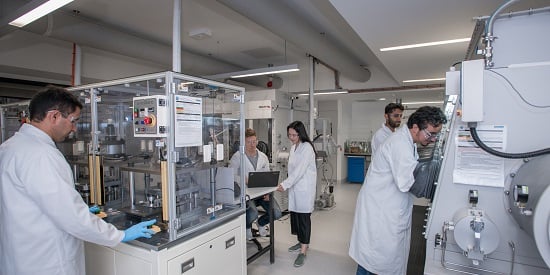Breakthrough in energy storage set to drive a cleaner future
Media release
Materials scientists at Deakin continue to lead the world in high performance battery innovation, advancing their knowledge in making safer, more efficient, and longer storage capacity batteries that can drive a clean energy future.
Deakin's Institute for Frontier Materials researchers, in collaboration with researchers from the University of Western Australia and Monash University, have discovered that super concentrated ionic liquids are key to achieving better batteries for future use, with the findings published today in Nature Materials.
The new work by ARC Centre of Excellence for Electromaterials Science (ACES) PhD student, Dmitrii Rakov and co-led by Professor Maria Forsyth and Dr Fangfang Chen presents an important breakthrough in the field, paving the way for the next generation of high energy density batteries for use in households and industries worldwide.
Professor Forsyth said this breakthrough is a key to achieving a clean energy future.
"This finding is very significant because it explains for the first time why an ideal combination of sodium metal anode and safe, high performing ionic liquid electrolytes can lead to much better batteries all round," Professor Forsyth said.
"Using molecular simulations coupled with experimental design, this is the first time we've been able to explain this optimised behaviour.
"Society is craving increased battery life, energy density and safety for state of the art Lithium ion batteries that can be used in energy storage for applications such as powering transportation and clean energy for homes.
"A sustainable energy future will require the revolutionary use of clean electricity to power our lives. This, in turn, requires highly efficient energy storage, which is at the heart of our research.
"Advances in science that enable rechargeable batteries to use reactive metals including lithium and sodium as anodes are a key to achieving high energy density energy storage technology; whereas better electrochemical reliability to mitigate safety concerns linked to reactive metals are ongoing and significant global challenges."
Current worldwide progress has been constrained by the type of electrolytes commonly used to make batteries.
Dr Chen said currently used electrolytes cause "dendrite formation" when they are frequently charged and discharged, which is a growth of lithium metal inside the battery.
"This can cause a short circuit that releases a large amount of heat and can lead to batteries exploding," Dr Chen said.
"In this new study we've explained how super concentrated ionic liquids that contain liquid electrolytes with very high salt concentration can help with battery stability and mitigate this safety issue."
The paper also highlights the importance of the pre-treatment processes in future battery development.
"Applying high voltage pre-treatment achieves more efficient anode operation, leading to longer lasting batteries. Preconditioning protocols are already critical steps in improved battery operation and this research will help to direct the future design of this process," Dr Chen said.
While their work has demonstrated the mechanism for sodium metal batteries, the team said the findings are applicable to other advanced batteries including lithium and zinc metal batteries.
The research, Engineering high energy density sodium battery anodes for improved cycling with superconcetrated ionic liquid electrolytes, was prepared as part of the ARC Centre of Excellence for Electromaterials Science (ACES) from a federal government grant.

